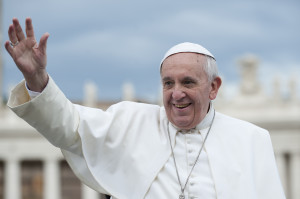Ripple effects of Laudato Si' in Zambia
- Published:
 Pope Francis. Picture: Shutterstock
Pope Francis. Picture: Shutterstock
Laudato Si’s message is still ringing out strong and clear, and is being acted on in diverse parts of this world. In April a conference was hosted by the Zambian Catholic Bishops’ Conference in Lusaka where ‘Care for our Common Home’ was explored in the context of large scale mining and agricultural investments.
“The conference aims to popularise Laudato si,” said Cardinal Peter Turkson, President of the Pontifical Council for Justice and Peace and senior advisor to Pope Francis. It aims to contextualise the message of the watershed 2015 encyclical and to generate practical commitments in stopping environmental degradation in Zambia.
Speaking to participants from the Church, government institutions, the private sector in mining and agriculture, concerned civil society organisations and many key stakeholders, Cardinal Turkson emphasized how the encyclical ‘touches on timely issues of the natural environment, as well as fundamental issues of faith, economy, natural resources, development, progress and lifestyle.’
In his welcoming remarks, Archbishop Telesphore Mpundu said that people had gathered at the conference to ‘mourn the destruction of the earth’. But Archbishop Julio Murat, the Apostolic Nuncio in Zambia, reassured the audience that not all was lost in saving the degenerated earth. It can be saved through correctional measures, small daily changes and decision making processes.
The importance of traditional values as a significant source of wisdom emerged from wide ranging discussions. Two central thoughts were expressed: “Laudato si is not new to Zambian traditional values. All values in it are also a part of Zambian traditional values.” As well as: “Traditional leaders have become squatters in their own land due to mining activities. There is a need to revisit the Zambian traditional values.”
Probing questions, relevant to much of the sub-continent were posed by small groups:
- How does dialogue reach people in rural areas who are the most affected?
- What are we doing about charcoal burning as a religious or prophetic people?
- What is the spirituality of environmental awareness that we will bring to our people?
- How can we bring the issue of climate change education, to change the mentality and spirituality amongst rural people?
- As Christians, do we have a conscience when we indiscriminately throw garbage away?
Ms Kawandami, Minister of Lands, Natural Resources and Environmental Protection, said the government was cognisant of the work of the church in Zambia and that it fully shares the concerns raised by the Church on prudent environment management. However, in his closing remarks, Cardinal Turkson spoke out boldy, criticising governments for being short-sighted in vision, mission and character. He pointed out that there is no interface from one government to another and they do not think of the long term consequences of their decisions. Thus generations inherit huge financial and environmental debts. He urged participants to support governments whose vision goes beyond their mandate.
Reflections on Laudato Si' have the potential to bring about a new level of consciousness about care for our “Common Home” and the community of life. The question is whether it has the power to mobilize courage and sufficient moral outrage that will translate into action?
Written for SAFCEI by Kate Davies
Who we are

SAFCEI (Southern African Faith Communities’ Environment Institute) is a multi-faith organisation committed to supporting faith leaders and their communities in Southern Africa to increase awareness, understanding and action on eco-justice, sustainable living and climate change.
Featured Articles
-

South Africa: Who Ends Up Paying If DMRE Cooks the Price of Nuclear Power?
-

South Africa’s nuclear energy expansion plans continue to draw criticism, environmental NGOs chew over legal challenge
-

Earthlife Africa and SAFCEI respond to latest unsettling nuclear news regarding the ministerial determination
-

Open Wing Alliance Africa (Virtual) Summit 2023
-

The Green Connection and SAFCEI respond to energy minister's divisive and deflecting comments
-

Job Vacancy: FLEAT Coordinator







